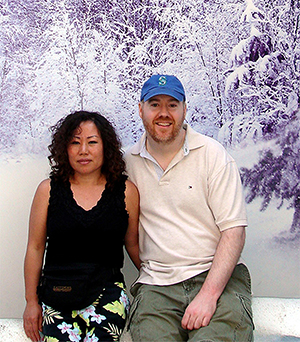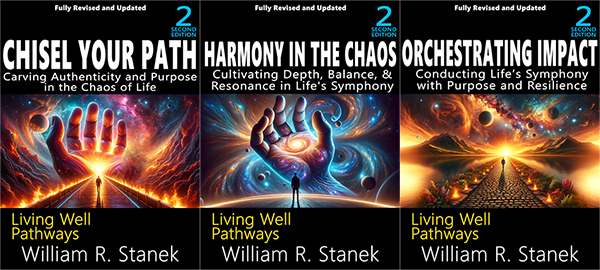

Living Well: Daily Habits and Practices
A fulfilling life is built on small, daily actions. In this series, William and Hui Cha Stanek share their insights on cultivating meaningful habits—from morning routines to simple practices that enhance well-being—helping you live with purpose and balance.

Transform your life with practical wisdom. Discover William Stanek's 'Living Well' series—your guide to a balanced and fulfilling life.
Discover William Stanek's Exclusive Art Collection
Explore and purchase the stunning art featured on this site. Own a piece of William Stanek's unique and captivating artwork today!
(May 1, 2025) The Art of Rest: Improving Your Sleep for Better Health
Sleep. We all need it, but how often do we truly prioritize it? For many, sleep is the first thing sacrificed in the name of productivity or simply keeping up with the demands of life. But what happens when sleep isn’t just a luxury but a necessity for survival? This is the reality that William and Hui Cha Stanek faced—William as he battled the debilitating effects of Gulf War Syndrome, and Hui Cha as she coped with the emotional and physical toll of multiple miscarriages.
Their journey to reclaiming their health wasn’t just about finding better treatments or adopting healthier habits; it was about learning the art of rest. Through hard lessons and painful experiences, they discovered that sleep isn’t just a passive state—it’s an active process of healing, recovery, and renewal. In this article, we delve into the importance of quality sleep for overall health and share the actionable strategies that helped the Staneks reclaim their vitality through rest.
The Hard Lessons of Exhaustion: William’s Battle with Chronic Fatigue
When William returned from the Gulf War, he was a different man. Not just because of the things he’d seen and done, but because his body was betraying him in ways he couldn’t understand. The chronic fatigue that set in after his deployment was relentless, draining his energy and clouding his mind. This wasn’t just tiredness—it was exhaustion that seeped into every aspect of his life.
At first, William tried to push through it. After all, he was a soldier, trained to endure and overcome. But no amount of grit could make up for the fact that his body needed rest. The fatigue wasn’t something he could fight—it was something he had to learn to manage. This was a hard lesson for a man used to tackling challenges head-on.
William’s journey to managing his chronic fatigue started with acknowledging that he couldn’t do it all. He needed to prioritize sleep, not just as a way to avoid exhaustion but as a fundamental part of his recovery. He began by making small changes—going to bed earlier, creating a consistent sleep schedule, and minimizing disruptions during the night. Over time, these changes made a significant difference, helping him reclaim some of the energy and mental clarity that had been lost to Gulf War Syndrome.
Creating a Sanctuary: How Hui Cha Crafted Sleep Rituals Amidst Life’s Storms
While William battled physical exhaustion, Hui Cha faced a different kind of challenge—emotional and physical trauma from multiple miscarriages. The grief and stress took a heavy toll on her, and sleep often felt like an elusive escape. But Hui Cha knew that if she was going to heal, both mentally and physically, she needed to find a way to rest.
In the midst of life’s storms, Hui Cha turned to her cultural roots for guidance. Growing up in South Korea, she had learned the importance of rituals in daily life—small, intentional actions that bring peace and balance. She applied this philosophy to her sleep routine, creating a sanctuary in their bedroom where rest was sacred.
Hui Cha’s sleep rituals were simple but powerful. She began by decluttering the bedroom, removing anything that wasn’t conducive to rest. The space was filled with calming scents, soft lighting, and comfortable bedding. She also established a bedtime routine that signaled to her body and mind that it was time to wind down. This included gentle stretching, sipping herbal tea, and engaging in quiet reflection or meditation.
These rituals weren’t just about improving sleep—they were about reclaiming a sense of control in a time when so much felt out of control. By creating a sanctuary for rest, Hui Cha was able to find solace and healing, even in the darkest moments.
Sleep as Recovery: The Staneks’ Approach to Healing Through Rest
For the Staneks, sleep became more than just a nightly ritual—it was a critical component of their overall health strategy. William and Hui Cha both recognized that their bodies needed time to recover from the physical and emotional tolls they had endured. Sleep wasn’t just about feeling rested in the morning; it was about giving their bodies the time and space they needed to heal.
William’s approach to sleep as recovery was influenced by his military training, where he learned that rest is as important as action. He applied this principle to his battle with Gulf War Syndrome, understanding that pushing through exhaustion could do more harm than good. Instead, he focused on optimizing his sleep environment and routines to support deep, restorative rest.
Hui Cha’s approach was rooted in the belief that healing is a holistic process. She viewed sleep not just as a physical necessity but as a spiritual practice, a time to let go of the day’s stresses and allow the body and mind to rejuvenate. Together, they developed a shared approach to sleep that emphasized consistency, comfort, and care.
Practical Tips for Better Sleep: What the Staneks Do Differently
If you’re struggling with sleep, whether it’s due to stress, health issues, or the simple busyness of life, the Staneks’ approach can offer some valuable insights. Here are some practical tips inspired by their journey:
1. Establish a Consistent Sleep Schedule
One of the most important factors in achieving quality sleep is consistency. William and Hui Cha found that going to bed and waking up at the same time every day helped regulate their internal clocks, making it easier to fall asleep and wake up feeling refreshed. Try to stick to a regular schedule, even on weekends, to maintain your body’s natural rhythm.
2. Create a Sleep-Inducing Environment
Your bedroom should be a sanctuary for sleep. Follow Hui Cha’s lead by decluttering the space and removing anything that might disrupt your rest, such as electronic devices or work-related items. Invest in comfortable bedding, and consider adding elements that promote relaxation, such as soft lighting, calming scents like lavender, and blackout curtains to block out light.
3. Wind Down with a Bedtime Ritual
A bedtime ritual can signal to your body that it’s time to sleep. Hui Cha’s routine included gentle stretching, drinking herbal tea, and engaging in quiet activities like reading or meditation. Find a routine that works for you, and make it a part of your nightly schedule. Avoid stimulating activities before bed, such as watching TV or using your phone, as these can interfere with your ability to fall asleep.
4. Optimize Your Sleep Environment
Temperature, noise, and light levels can all impact your sleep quality. The Staneks found that keeping their bedroom cool and quiet, with minimal light, helped them sleep more soundly. Consider using a white noise machine or earplugs if you’re sensitive to noise, and ensure your mattress and pillows are supportive and comfortable.
5. Listen to Your Body
Finally, one of the most important lessons from the Staneks’ experience is to listen to your body. If you’re feeling tired, it’s okay to rest. Don’t force yourself to stay awake if you need sleep, and don’t push through exhaustion. Your body knows what it needs—sometimes, the best thing you can do is simply listen.
Call to Action: Adopt Sleep Rituals Inspired by the Staneks
The art of rest is more than just getting enough sleep—it’s about creating an environment and routine that supports deep, restorative rest. Inspired by William and Hui Cha’s journey, I encourage you to adopt your own sleep rituals. Start by making small changes to your sleep environment, establishing a consistent routine, and prioritizing rest as a key component of your overall health.
As you implement these changes, pay attention to how your sleep improves and how you feel during the day. Better sleep can lead to better health, increased energy, and improved overall well-being. Share your experiences with us using the hashtag #RestWithTheStaneks. Let’s create a community where rest is valued, and where we support each other in the journey toward better health through better sleep.
Conclusion: The Transformative Power of Rest
In a world that often glorifies busyness and productivity, it’s easy to overlook the importance of rest. But as William and Hui Cha’s story shows, sleep is not just a passive activity—it’s an essential part of maintaining and improving our health. Whether you’re dealing with chronic fatigue, emotional stress, or just the demands of everyday life, the quality of your sleep can make all the difference.
By embracing the art of rest and prioritizing sleep, you can improve not only your health but also your ability to navigate life’s challenges. Remember, rest isn’t just about sleep—it’s about healing, recovery, and renewal. So tonight, take a cue from the Staneks: create your sanctuary, embrace your rituals, and let the power of rest transform your life.

Join William at the crossroads of technology, business, and leadership, where true influence isn't about titles - it's about inspiring action, driving change, and guiding others with integrity. Discover how authentic leadership can transform not just careers, but entire industries.
Bring Inspiration Home
Enhance your space with William Stanek's evocative art. Each piece is crafted to inspire and uplift your everyday life.

Support The Lights of Paris by Robert Stanek, William Stanek's pen name! Through vivid historical detail and deeply moving character stories, Robert takes readers on an unforgettable journey through one of history’s most transformative times.

















